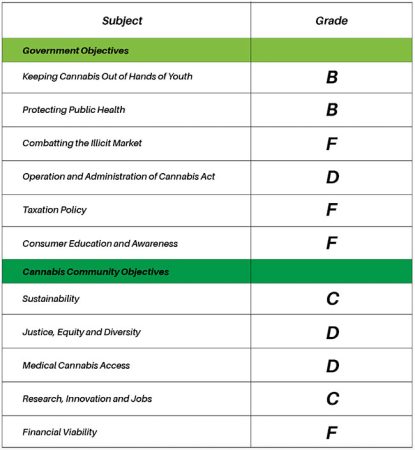
Features
Business
Regulations
Why ‘We’re Not Done Yet’
January 7, 2022 By George Smitherman
 Photo: freshidea/ADOBE STOCK
Photo: freshidea/ADOBE STOCK Tension (or anticipation) is certainly rising across the Canadian cannabis community. The third anniversary of the legalization of recreational cannabis has passed. The new Trudeau Cabinet has been sworn in. The green flag for the formal launch of the Statutory Review of the Cannabis Act will soon follow. The time has come for the cannabis community to come together and secure the changes needed to fulfill the social and economic promise of legal cannabis.
The Cannabis Council of Canada (C3) used the third anniversary of the adult recreational legalization to develop the ‘Not Done Yet Report Card’ (available online) on the success of Canada’s legalization initiative. Building on the report card the C3 issued at the second anniversary, this year, C3 worked with the cannabis community to tell its story. C3 received a lot of valuable input and feedback from across the community, including from NORML, Cannabis Amnesty, and Medicinal Cannabis Canada (MCC).
In the ‘Not Done Yet Report Card’, C3 provided adult-use cannabis legalization with an overall grade of ‘D’. The ‘D’ grade was validated with 11 subgrades and was provided a rationale for each. While acknowledging the act of political leadership behind legalization, C3 concluded that one of its key objectives – keeping the profits of cannabis out of the pockets of organized criminals – has not been achieved. The fact remains that at least 50 per cent of the cannabis consumed by Canadians, is coming from illicit sources.
The work at hand for our industry, sector and community is large, because the agenda of change that we seek to influence is large. Putting an end to the current practice whereby the cannabis industry is funnelled off to Health Canada, only to be told that Health Canada doesn’t have an economic mandate, is a major strategic priority for our sector. I emphasize at every turn that it is the responsibility of a regulated sector to establish an open dialogue with those who do the regulating and the law making.
Building on the ‘Not Done Yet Report Card’, C3 will focus on four policy thrusts:
- Nanny state regulation and administrative overkill
- Social progress for patients, pardons, and diversity and inclusion
- Excise tax, government program access, and financial viability
- Reduce public risks from illicit products and prevent tax diversion
C3 will use these policy thrusts to engage with its membership and the cannabis community and to underpin its conversations with governments. While the formal Statutory Review conducted by Health Canada may be limited to the Cannabis Act, C3’s agenda for change will not be governed by this boundary. After all, cannabis generates more than $15 billion in gross domestic product (GDP) annually, and employs tens of thousands of Canadians in regions, cities, and towns from coast to coast to coast.
Our community’s geographic footprint is a source of untapped strength. Cannabis is relevant and impactful in each and every riding (338 of them) across Canada. In 2022, our sector will be called to Ottawa to speak with MPs in an event I like to call ‘Cannabis on the Hill’ – part of a larger ‘tour de force’ of the cannabis community. It’s critical that we build awareness with MPs of all parties about the nature of our sector, the opportunities that we have created, and the hopes and plans we have for the future. So, if you haven’t already built it into your standard operating procedure (SOP) then it’s time to establish relationships with your local politicians. The adage that ‘all politics are local’ couldn’t be truer.
We are a community of more than six million people. It’s time to end the stigma and discrimination holding back legal cannabis, including medical cannabis and medical cannabis-related products. As the ‘Statutory Review’ green flag waves, I recommend you buckle up and join the ride as we strive to fulfill the unmet social and economic promise of cannabis legalization, because ‘We’re Not Done Yet’.

C3 evaluated Canada’s adult-use cannabis legalization initiative on a range of subjects, and gave grades for each with supported explanations of the rationale. C3 hopes this will be an effective way of sharing perspectives with Canadians on the accomplishments and unrealized opportunities of cannabis legalization.
Photo: Cannabis Council of Canada
An additional announcement
As the newly appointed ministers settle into their roles and begin the arduous task of onboarding new information (often described as drinking from the fire hose), one thing should be abundantly clear if it isn’t already; Canada finds itself with a depth of experience and intellectual capacity with Health Minister, Jean-Yves Duclos and Associate Health Minister, Carolyn Bennett.
Duclos is an acclaimed economist, elected since 2015 from the Québec City area riding of Québec. Noteworthy is his past departmental experience as the president of the Treasury Board, blending operational realities with a broad knowledge of the whole operation of the Government of Canada.
Bennett is a respected family physician who participated in thousands of births during her practice. The new associate health minister is a long serving MP, first elected in 1997 from the Toronto riding of St. Paul’s. As Ontario health minister during the Martin government, I had a first-hand experience working with Bennett. As the then minister of State for Public Health, she was instrumental in establishing the Public Health Agency of Canada (PHAC) and contributed to the important work leading up to the Kelowna Health Accord. She comes to Health Canada following six years of public service in support of reconciliation with Indigenous peoples.
Elsewhere, the shuffle produced a new minister of public safety in former prosecutor, Marco Mendocino. Mendocino takes the helm at a place where he can help expedite pardons for simple cannabis possession and bring more focus to the illicit cannabis industry and its unfettered access to Canadians. Ministers in key economic portfolios remain unchanged, with Mary Ng at International Trade, Export Promotion, Small Business and Economic Development, François-Philippe Champagne at Industry, Science and Innovation, and Marie-Claude Bibeau at Agriculture. A network of regionally-focused ministers has emerged to support seven Regional Economic Development Agencies across Canada.
Deputy Prime Minister Chrystia Freeland retains her role as minister of finance, retaining her oversight of matters critical to the overall viability of the industry, especially given the excessive level of the excise tax on cannabis. Her vast reach makes her a key catalyst for progress on issues such as providing capital to encourage more black, Indigenous, and people of colour (BIPOC) community participation across the cannabis sector.
So, while the Statutory Review may be the domain of the Department of Health, the broader agenda of the cannabis industry includes the important objective of being recognized by what is often called the ‘official Ottawa’, described above.
George Smitherman is the president and CEO of the Cannabis Council of Canada, the national organization for licensed cannabis producers. His memoir, Unconventional Candour, published by Dundurn, highlights the ups and downs of his life in politics.
Print this page